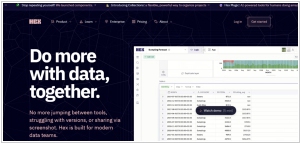Top 10: Data Collaboration platforms
Updated: July 30, 2023
Data collaboration platforms are advanced solutions that facilitate secure and efficient sharing, collaboration, and analysis of data among teams and stakeholders. These platforms provide a centralized environment where users can upload, store, and access data from various sources, ensuring data consistency and eliminating silos. With robust data governance and access controls, data collaboration platforms safeguard sensitive information and ensure that only authorized users can access specific datasets. These platforms often offer advanced data visualization and analysis tools, allowing teams to gain valuable insights and make data-driven decisions collaboratively. Moreover, data collaboration platforms enable seamless collaboration through features like real-time data sharing, data commenting, and version control, fostering efficient teamwork and promoting a culture of data-driven collaboration within organizations. By leveraging data collaboration platforms, businesses can accelerate decision-making processes, enhance productivity, and harness the full potential of their data resources to achieve strategic goals and drive innovation.
Some of the most popular data collaboration platforms are listed below.
See also: Top 10 Business Intelligence software
See also: Top 10 Business Intelligence software
2023. Hex lands another $28M as data collaboration platform continues to gain traction

Hex, a data collaboration startup, has raised $28M funding round. The company now has 450 paying customers including Brex, Notion, Toast and Chegg. He believes that the collaborative approach to data and the growing recognition that AI is transforming workflows are the biggest reasons for the product’s growing popularity. Most recently, the company added a tool called Hex Magic, a generative AI approach to interacting with the data with plain language by asking questions about the data, or asking Hex to undertake a task like auto-completing a join, and the software responds to the requests. He sees this as a way to expand the user base beyond folks like data scientists and people who know SQL or Python.

